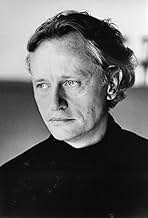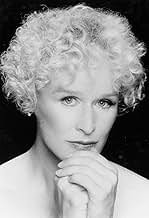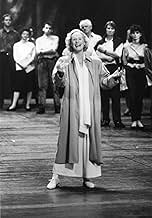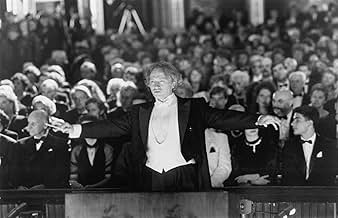NOTE IMDb
6,6/10
1,5 k
MA NOTE
Ajouter une intrigue dans votre langueHungarian conductor plans bold "Tannhäuser" production amid opera politics, artistic egos, nationalism, union conflicts, and funding challenges in critique of Grand Opera and European Union.Hungarian conductor plans bold "Tannhäuser" production amid opera politics, artistic egos, nationalism, union conflicts, and funding challenges in critique of Grand Opera and European Union.Hungarian conductor plans bold "Tannhäuser" production amid opera politics, artistic egos, nationalism, union conflicts, and funding challenges in critique of Grand Opera and European Union.
- Réalisation
- Scénario
- Casting principal
- Récompenses
- 3 victoires et 2 nominations au total
Johara Farley
- Dancer
- (as Johara Racz)
Dieter Rita Scholl
- Delfin Van Delf
- (as Rita Scholl)
Avis à la une
This film is much more than a customary movie about opera, though opera lovers get first-rate extracts from Wagner's Tannhauser as well. The action takes place in an imaginary "Opera Europe" in Paris. István Szabó, the excellent film director is really interested here in fanatic people of the theater who came from several countries of Europe to unite their talent in order to create a successful performance of Wagner's youthful masterpiece. The ensemble is a mixture of multinational people: the head of the company (a Spaniard, a former hero of the Spanish Civil War,) her private secretary and mistress (descendant of a noble Russian family,) the conductor (a talented young Hungarian who suffers from inferiority complex because of his East-block origin,) the singer who plays Tannhauser (a permanently offended dumpy man from the DDR with beautiful voice,) the French theatrical technician (a pig headed trade unionist who causes much trouble,) etc. They carry with themselves all good and vicious habits and traditions of their origin which cause many conflicts but humorous episodes as well during the rehearsals. There is a remarkable scene when at a dinner party the protagonists put aside all of their conflicts and sing together a song called "Suliko" which was once Stalin's favorite. (They sing it not because they love Stalin, but because of a certain nostalgia for their youth.) In the center of the story stands the Hungarian conductor's and a Nordic singer's (played by Glenn Close) stormy love affair which ends in diminuendo (using here deliberately this term of music.) Strongly recommended for everyone who loves art and theater.
I saw this last night on UK TV. Glenn Close looked the part as a diva.
Her mouthing of Kiri Te Kanawa's singing was stunning. I've seen Elizabeth Schwarzkopf and Victoria de los Angeles sing, from the front row, and I would have believed this to be real thing, had it not been a movie.
I can only imagine that Te Kanawa recorded it after Close has shot the scenes. Otherwise, Close is a wonderful mimic.
Anyway, I was charmed by the movie. Simplistic it may be. But then so was Shakespeare in Love. And, as there, a miracle happens when the curtain goes up (except that there was no curtain at the Globe and here it doesn't actually go up, which is where the miracle happens).
David
Her mouthing of Kiri Te Kanawa's singing was stunning. I've seen Elizabeth Schwarzkopf and Victoria de los Angeles sing, from the front row, and I would have believed this to be real thing, had it not been a movie.
I can only imagine that Te Kanawa recorded it after Close has shot the scenes. Otherwise, Close is a wonderful mimic.
Anyway, I was charmed by the movie. Simplistic it may be. But then so was Shakespeare in Love. And, as there, a miracle happens when the curtain goes up (except that there was no curtain at the Globe and here it doesn't actually go up, which is where the miracle happens).
David
Various musicians and singers of many nationalities led by Hungarian conductor Zoltan Szanto (Niels Arestrup) are gathering in Paris for a new opera performance to celebrate the new Europe. He begins a fling with Karin Anderson (Glenn Close), the star of the show. He has to navigate the jealousy, ambitions, bureaucracy, former communists, national rivalries, and union regulations.
There are some funny bits with the story background. All the chaos has some fun. The romantic plot is a little flat and the drama comes out of nowhere. I didn't realize that he was married. Karin gets hot and cold for unforeseeable reasons. I do like Glenn Close's performance but it can be abrupt. The script should spend a little more time ironing out the drama in the relationship. I don't know much about the music and I don't care that much about it either.
There are some funny bits with the story background. All the chaos has some fun. The romantic plot is a little flat and the drama comes out of nowhere. I didn't realize that he was married. Karin gets hot and cold for unforeseeable reasons. I do like Glenn Close's performance but it can be abrupt. The script should spend a little more time ironing out the drama in the relationship. I don't know much about the music and I don't care that much about it either.
A marvelous film that anyone with an interest in classical music will enjoy - be they an opera lover or hater. Excellent bravura performances by Close and Arestrup conjure up a heady mix of artistic temperament, the politics of "The Arts" and great music. It is great fun. The film is exuberantly directed and the pace never lets up. A triumph for Director Victor Szabo.
I've seen this movie many times now. It covers most of the things that is evident in an opera house and productions. Though some of the sceneries, dramatic situations are slightly exaggerated, I still think it is well achieved attempt to recreate typical scenes of an opera production, love stories, conflicts with opera managers, strikes, problems with orchestral musicians and singers, corrupt non-environmental cooperation sponsors, Paris and Budapest cultural milieus.
But there is some small flaws. Erland Josephson who plays Picabia (General Director of Opera Europa) is a great actor but he doesn't do it all well with his Spanish pronunciation and pronounces Karin in with real Swedish accent. Otherwise he's portraying the role of with absolute perfection.
Glenn Close is simply marvelous as the Swedish soprano and Niels Arestrup as Maestro Szanto is very credible in his role as the conductor.
The music from Tannhäuser by Richard Wagner works as a third character in this movie, same function as the other movie Amadeus (1984) by Milos Forman. I would recommend anyone to see this movie, to simply enjoy it over a nice evening!!
But there is some small flaws. Erland Josephson who plays Picabia (General Director of Opera Europa) is a great actor but he doesn't do it all well with his Spanish pronunciation and pronounces Karin in with real Swedish accent. Otherwise he's portraying the role of with absolute perfection.
Glenn Close is simply marvelous as the Swedish soprano and Niels Arestrup as Maestro Szanto is very credible in his role as the conductor.
The music from Tannhäuser by Richard Wagner works as a third character in this movie, same function as the other movie Amadeus (1984) by Milos Forman. I would recommend anyone to see this movie, to simply enjoy it over a nice evening!!
Le saviez-vous
- AnecdotesOpera singer Kiri Te Kanawa dubbed the singing voice of lead actress Glenn Close.
- Citations
Zoltan Szanto: I could mix up my work with my private life.
- Bandes originalesTannhäuser
(extraits)
Music by Richard Wagner
Performed by Kiri Te Kanawa, René Kollo, Håkan Hagegård, Waltraud Meier,
Renate Spingler, Matthias Hölle, Kim Begley, Robin Leggate, Rodney Macann,
, Roderick Earle with The Philharmonia Orchestra (as London Philharmonia Orchestra)
Conducted by Marek Janowski
Meilleurs choix
Connectez-vous pour évaluer et suivre la liste de favoris afin de recevoir des recommandations personnalisées
- How long is Meeting Venus?Alimenté par Alexa
Détails
- Date de sortie
- Pays d’origine
- Langues
- Aussi connu sous le nom de
- Meeting Venus
- Lieux de tournage
- Sociétés de production
- Voir plus de crédits d'entreprise sur IMDbPro
Box-office
- Montant brut aux États-Unis et au Canada
- 1 000 348 $US
- Week-end de sortie aux États-Unis et au Canada
- 65 715 $US
- 17 nov. 1991
- Montant brut mondial
- 1 000 348 $US
Contribuer à cette page
Suggérer une modification ou ajouter du contenu manquant


























